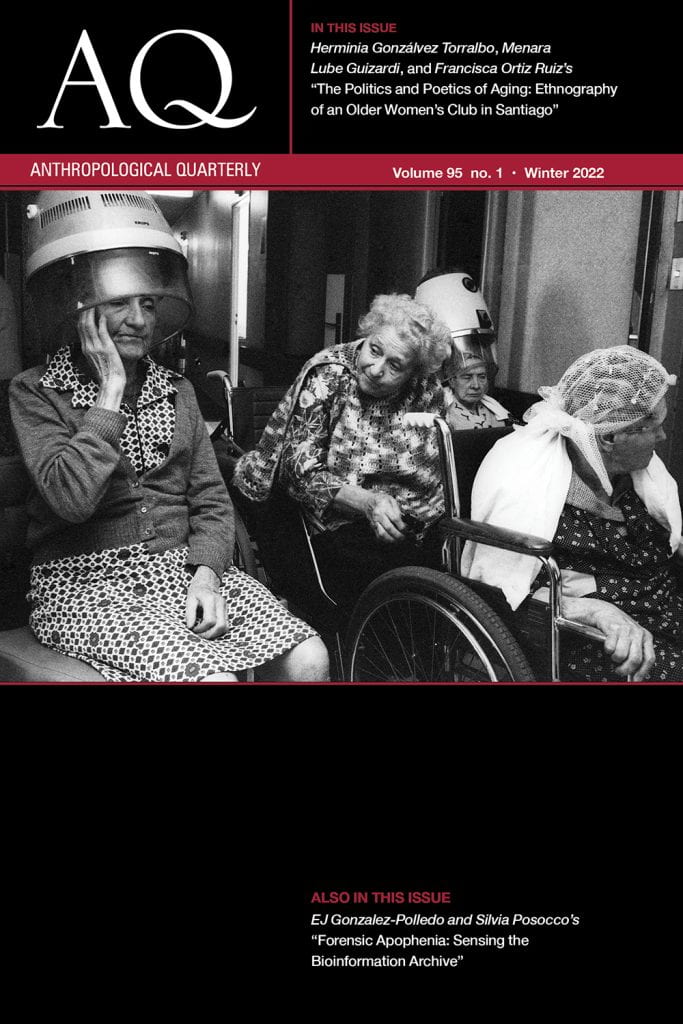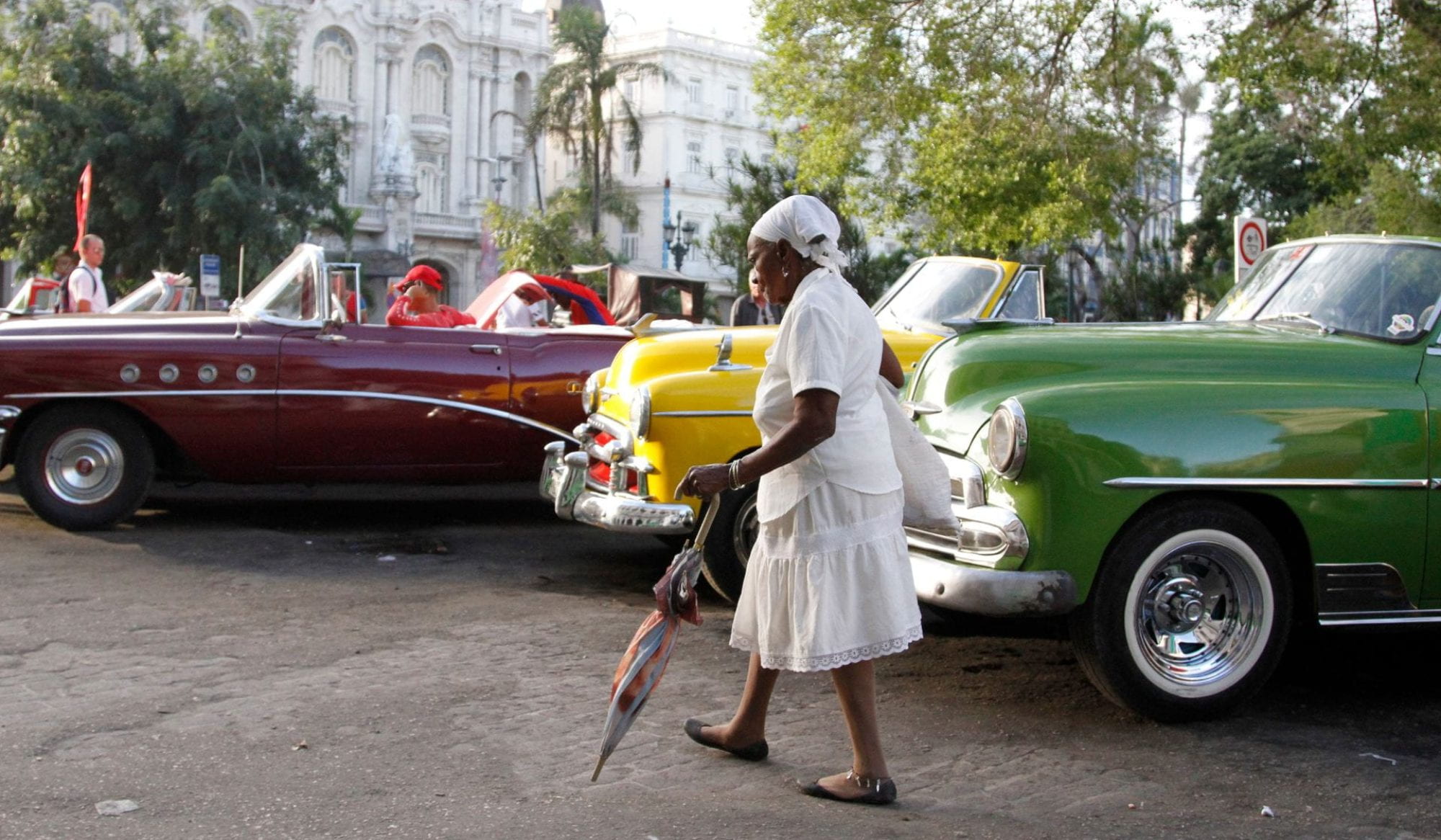
TABLE OF CONTENTS
Vol. 95, No. 1
ARTICLES
Herminia Gonzálvez Torralbo, Menara Lube Guizardi, and Francisca Ortiz Ruiz | The Politics and Poetics of Aging: Ethnography of an Older Women’s Club in Santiago
Ed Pulford | Caught Between Spectacles: Migrant “Clean-ups,” Gendered Performance, and the State in a China-Russia Border Town
Jessica Pouchet | A Double Standard in Development Encounters: Language and the Making of Green Entrepreneurs in Tanzania
EJ Gonzalez-Polledo and Silvia Posocco | Forensic Apophenia: Sensing the Bioinformation Archive
Chenyu Wang | Volunteering for “Bitterness”: The Self-Fashioning Power of Volunteering Teaching in China
SOCIAL THOUGHT & COMMENTARY
Nehemia Stern | “Philology’s a Thing of God!”: Edward Sapir and the Jewish Subtexts of American Anthropology
NEW RELEASE BOOK REVIEWS
Richard Handler | Sounding, Historically, Anthropology’s Current Crisis
Antonio Sorge | Michael Herzfeld’s Subversive Archaism: Troubling Traditionalists and the Politics of National Heritage
BOOK REVIEWS
Kenza Yousfi | Jerome Whitington’s Anthropogenic Rivers: The Production of Uncertainty in Lao Hydropower
Denise Brennan | Sarah Luna’s Love in the Drug War: Selling Sex and Finding Jesus on the Mexico-US Border
Samantha Maurer Fox | Christina Schwenkel’s Building Socialism: The Afterlife of East German Architecture in Urban Vietnam
Lochlann Jain | Alisse Waterston and Charlotte Corden’s Light in Dark Times: The Human Search for Meaning
Bradley Jones | Sarah Besky’s Tasting Qualities: The Past and Future of Tea
Jocelyn Lim Chua | Andrew Bickford’s Chemical Heroes: Pharmacological Supersoldiers in the US Military
Andrew Sanchez | Partha Chatterjee’s I Am the People: Reflections on Popular Sovereignty Today

ABSTRACTS
The Politics and Poetics of Aging: Ethnography of an Older Women’s Club in Santiago
Herminia Gonzálvez Torralbo, Central University of Chile
Menara Lube Guizardi, Universidad de Tarapacá
Francisca Ortiz Ruiz, The University of Manchester &
Millennium Institute for Caregiving Research
This article presents an ethnographic study of aging, gender, and the social organization of care in a women’s ceramics course given in a Community Center of Santiago Centro (Chile). Its theoretical framework focuses on the concepts of gender, aging, and care in social sciences. The study is based on an ethnography carried out over three years in a Community Center. The paper highlights the narratives, modes of organization, and dynamics articulated in this women’s club. Our analysis suggests that there is a political dimension to care. We argue that political dimensions are found in the women’s collective organization within their club: they are subjects endowed with lines of action, interaction, and politically placed discourse that stem from their own key interpretations. Finally, our findings suggest that this political agency is linked to at least four aspects of our protagonists’ experience in their club, which are described in the results. [Keywords: Gender, aging, community care, Santiago, Chile]
Caught Between Spectacles: Migrant “Clean-ups,” Gendered Performance, and the State in a China–Russia Border Town
Ed Pulford, University of Manchester
On a background of increasingly draconian state policies targeting transnational migrants across the world, anthropologists and other scholars have documented the insidiously discriminatory operation of controls over movement of people. Often focused on Europe and the United States, this work has revealed how migrant crackdowns amount to “spectacles of illegality” (per De Genova 2013) in which processes of illegalization and racialization proceed hand-in-hand: a migrant’s lack of legal status is made to stand in for traits against which it would be impolitic to discriminate, particularly race and class. These critiques, often framed in universalizing terms, carry considerable weight when levelled at polities which, at least on paper, claim not to differentiate on the basis of such differences. But authoritarian and postsocialist states such as the People’s Republic of China present a different case: official approaches to ethnic minority and “low-end” members of the populace show that systematic and explicitly articulated differentiation on the basis of ethnicity, race, and class is central to the operation of the state itself. As this article demonstrates by focusing on a Russian community in northeast China, migrants to China have recently been subjected to enforcement measures mirroring those in Euro-America. However, unusually for a group of racialized migrants, Russian involvement in illegalizing “spectacles” collides with their participation in an entirely different more valorizing performance, a gendered staging of their Russianness to celebrate the “Friendly” state-state relationship between China and Russia. Russians are caught between two kinds of spectacle which operate along parallel lines of racializing differentiation. Their situation thus offers anthropologists and others new insights into how the PRC’s inward and outward-facing approaches to difference intersect, in turn shedding light on broader questions of ethnic and racial privilege, and the limits to universalizing critiques of state migratory enforcement. [Keywords: Migration, racialization, China, Russia, difference, spectacle, authoritarianism]
A Double Standard in Development Encounters: Language and the Making of Green Entrepreneurs in Tanzania
Jessica Pouchet, Bucknell University
International aid interventions can perpetuate the inequalities they claim to redress. Indeed, anthropological research on development has shown how many of the structures and practices of contemporary programs draw on colonial modes of social differentiation to exert control. This article identifies yet another mechanism of such differentiation that emerges in development encounters—those moments of social interaction between development professionals and the people they view as target beneficiaries. Drawing on ethnographic research from a biosphere in Tanzania, where development professionals aimed to convert poor farmers into green entrepreneurs by way of changing their “mentality,” I argue that a double standard in language ideology is a key mechanism through which efforts to empower become efforts to control. This double standard in language ideology recognizes language as a tool for some and as a mere reflection of belief for others. With such a double standard at work, participants in the green entrepreneurship program, and development workshops more generally, have to navigate the awkward politics of inhabiting and animating the limited roles that the international aid industry casts for them. Moreover, despite holding a language ideology that overlooks program participants’ creative capacity to use language instrumentally, development professionals depend upon participants’ choices to linguistically cooperate in workshops and meetings to claim success. I argue that this double standard in language ideology is an important means through which campaigns to empower the poor relegate them to subordinate roles instead. [Keywords: International development, language ideologies, green economy, biodiversity conservation, empowerment, Tanzania]
Forensic Apophenia: Sensing the Bioinformation Archive
EJ Gonzalez-Polledo, University of London, Goldsmiths
Silvia Posocco, University of London, Birkbeck
This article draws on intersecting debates on archives, infrastructures, and knowledge in anthropology to analyze a “bioinformational turn” in forensic science. Focusing on transformations in forensic science provision in England and Wales apparent in the history of a forensic archive, the article frames frictions between ways of making knowledge across scientific cultures, law enforcement, and a legal system that aims to create facts and certainty, against forensic scientists’ concern with process and context across disparate realms of practice. Following scientists’ descriptions of the changing conditions under which forensic science is currently practiced and the erosion of forensic provision as a public service, we argue that forensic practitioners interrogate positivist projections of forensic science by thinking with complexity as they follow evidence through multiple registers, infrastructures, and datasets. [Keywords: Biomaterials, bioinformation, archives, relations, forensics, truth, facts]
Volunteering for “Bitterness”: The Self-Fashioning Power of Volunteering Teaching in China
Chenyu Wang, Hamilton College
Each year, a growing number of Chinese university students volunteer in schools in the rural areas of China, participating in grassroot NGOs whose goal is to alleviate the urban-rural education gap in China. Based on a large project on educational NGOs in China, I show that a salient part of the volunteers’ experience is encountering struggles that they must overcome: they “eat bitterness” in their volunteer labor. In willingly traveling to underprivileged areas and “eating bitterness,” Chinese youths create idealistic educational projects and fashion themselves as agents who counter the structural inequality in the State’s education system. For them, the “bitterness” is a site for self-transformation and a source of hope for equitable access to cosmopolitan education in rural and urban China alike. The ethos of “eating bitterness” is critical in diverse areas of Chinese life, where it connects suffering to moral and social transformations, individually and collectively. Here, it forms an experiential nexus of a progressive theory of change that synthesizes self-development with intense personal investment in bringing about change. That this change is disconnected from politics is a crucial enabling condition, and also ennobling—at least to participants. Joining an emerging conversation on the anthropology of politics, this article hopes to potential diverse understandings about politics and ethics in a “post-political” world. [Keywords: Volunteerism, politics, NGOs, youths, China]
“Philology’s a Thing of God!”: Edward Sapir and the Jewish Subtexts of American Anthropology
Nehemia Stern, Ariel University
This Social Thought & Commentary piece explores certain Jewish subtexts of American anthropological thought from the first half of the 20th century, focusing on the theoretical and artistic work of Edward Sapir. Utilizing Sapir’s academic, lay, and distinctly Jewish publications, along with newly uncovered archival material, I argue that Sapir’s deep ambivalence regarding the prospects for Jewishness and modern Jewish identity in the United States can be seen as a subtext woven within his cultural and poetic writings. This essay demonstrates the ways in which Sapir’s individualist interpretation of Boasian cultural theory was conditioned by his profound concern for the prospects for Jewish ethnic, national, and religious survival in the US. Drawing on these subtexts found in Sapir’s cultural corpus, this piece seeks to better understand the ways in which ideas of Judaism and Jewishness manifest themselves more broadly within the history of American anthropological thought. [Keywords: Culture concept, Boasian, Edward Sapir, history of anthropology, Jewish identity]

